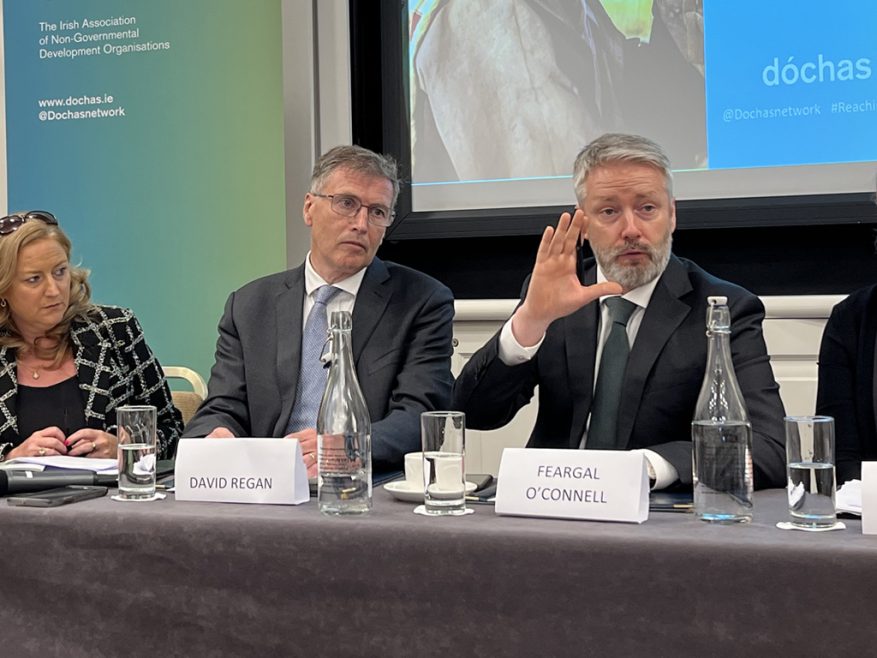by Feargal O’Connell, Self Help Africa CEO
Ireland’s overseas aid programme represents a good investment for our country, and it is more important than ever.
That was my message to decision-makers, when I spoke at the recent Dóchas (the Irish network for International Development and Humanitarian organisations) pre-budget briefing that was held in Dublin.
The purpose of the event – ‘Conflict, Climate & Hunger: A Call to Action’ – was to urge the Irish Government to make real and tangible progress towards a 0.7% spend of Gross National Income (GNI) on ODA by 2030, in their 2024 Budget. This would bring Ireland in line with world leaders in this area Sweden, Norway, Denmark, Luxembourg and the Netherlands, who consistently reach or exceed the target.
I spoke of the current crises that were undoing decades of development progress, and the importance of Ireland’s ODA in providing solutions to some of our biggest global challenges.
COVID-19, war in Ukraine and drought in the Horn of Africa: An unprecedented challenge
The last few years have seen one global crisis on top of another, and it’s the world’s poorest and most vulnerable people, who have been hardest hit.
In sub-Saharan Africa, the COVID-19 pandemic caused a drastic slow-down in the inward investments that had fuelled economic growth and reduced poverty over the preceding decade or more.
The war in Ukraine triggered a spike in global food and fertiliser prices. The impact on countries like Ethiopia and Kenya has been devastating. Before the war, 50% of Ethiopia’s food imports came from Ukraine and Russia. Food staples have skyrocketed in price. The cost of essentials like cooking oil is up over 200%.
In Kenya, maize is so scarce that the price of a 90kg bag has almost tripled in the space of a year. Millions of households are simply unable to afford their staple foods.
As if this wasn’t enough of a challenge for people to contend with, the Horn of Africa is currently in the grip of the worst drought in over 40 years.
Five successive failed rainy seasons has led to a catastrophic loss of life and has killed millions of livestock over the last 18 months. Failed harvests have left tens of millions of people in need of emergency food aid.
I really can’t overstate the depth of the catastrophe here. If any one of these crises were to happen in isolation, I’d still be writing here on the incredibly dire consequences facing the people that Self Help Africa works with.
The impact of Official Development Assistance:
What this shows is that now, more than ever, we need to reach the furthest behind first. This lies at the heart of Dochas’ 2024 Pre-Budget submission, which urges the Irish Government to accelerate progress on reaching the furthest behind first, through an increase in ODA spend.
I’ve been hugely privileged throughout the course of my career to be involved in the direct delivery of incredible, life-changing projects that have been funded by Ireland’s ODA.
I’ve seen incredible things happen. I’ve seen food security increase. I’ve seen levels of child malnutrition plummet. I’ve seen health indicators improved, and crop yields increased. All because of quality programmes delivered by Irish NGOs thanks to Irish Aid and Ireland’s ODA.
What does an ODA funding increase mean for programmes?
With all that said, we need to ask some honest questions too. We need to consider what reaching 0.7% – an increase of hundreds of millions of euro – means in terms of the pressure that puts on Ireland’s capacity to support the increase in programmes that will result.
We must ask: Can we scale-up ODA funding in a responsible way? One that maintains the very high levels of quality that have always been associated with Irish Aid? I’m confident that we can, providing that any increase in funding is supported by policies that seek to address the root causes of crises such as climate change.
In the face of drought, we must adapt and evolve agricultural systems for smallholder farming families. These families produce up to 70% of food in Africa. We must do this if we are to end extreme hunger and poverty in one of the world’s most climate-vulnerable regions.
What does this look like? At Self Help Africa, with support from Irish Aid, our solutions include early weather warning systems. Our work here has included installing hundreds of manual and automatic weather stations. But these early warning systems only work, if they receive early responses.
Farmers need to have the right tools in the toolbox to respond to extreme weather events too. Here, the introduction of drought-tolerant and early-maturing crop varieties are vital to support households in times when rains are scarce. Similarly, late-maturing, high-yielding crop varieties can be distributed and grown when rains are good.
Cassava is also being widely promoted by Self Help Africa and other organisations as an alternative to more weather-sensitive maize. Traditional African crops like sorghum and millet are also being reintroduced and promoted as alternate staples for farming households.
Ireland’s role on the global stage
Ireland has long played a significant role in supporting global efforts to end extreme hunger and poverty. There has been massive investment by the Irish government in our overseas development programme. Amazing work has been done.
Yet, the current hurricane of crises the world is facing, demonstrates that we are facing an uphill battle.
We cannot turn away at this critical juncture. Ireland must continue to show leadership in global initiatives to tackle hunger and poverty.
As global temperatures have risen, fuel, food and fertiliser prices have risen too. The numbers of people living in extreme hunger have risen. Now, we too must rise to these challenges and respond as Ireland has always done, with quality, life-changing programmes delivered by Irish NGOs on behalf of the Irish public.

